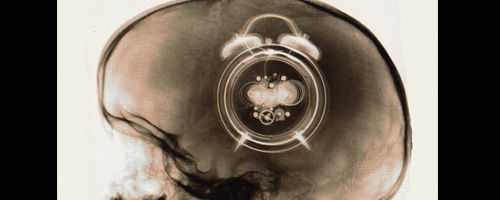We all have a very precise internal biological clock, one that regulates our wake-sleep cycle that is exactly 24 hours and 30 minutes long. The existence of this internal clock was demonstrated in 1962 by the French speleologist Michel Siffre.

Deprived of a watch and in complete isolation during two months at the back of an ice cave, Michel Siffre lost all temporal markers and was thus no longer able to tell what time of day it was. Had he been awake a few minutes or a few hoursı How could he tell how long he had sleptı In the absolute darkness of the subterranean night, his memory also began to falter.
Siffre’s only link to the outside was a telephone. Each time that he went to sleep and each time that he woke up, he had to call the surface, yet he was not given any indication of what the real time was. After two months, he was told that the experiment was over. But he disagreed. He thought that it was only August 18, when in reality, it was September 14.
Although he had lost all temporal guideposts in the absence of a day-night cycle and was therefore unable to measure the passage of time, his body, on the other hand, continued to be precisely regulated by his biological clock. His calls to the surface showed that his wake-sleep cycles were exactly 24 hours and 30 minutes. If he spent more time awake, then his sleep time was shorter, even if he did not consciously realize it, mistakenly thinking that he had slept 10 minutes while he had actually slept 8 hours.
This discovery shook up our understanding of Man’s rhythms and, more importantly, our understanding of life’s rhythms, at least on Earth, since the cycle of 24 hours and 30 minutes obviously is derived from the rotation of our planet. Beyond these scientific
observations, notably in the conquest of space, this experiment is quite fascinating. It demonstrates that time as we know it is rooted in the heart of our very being, in our cells. It is an integral part of our existence, whether we are aware of it or not, whether we want it to be or not.
Perhaps this profound relationship of time with our bodies is the reason that the fascination for mechanical watches continues to be so strong, even if the mechanical technology used is, in itself, obsolete.
The notion of a ‘temporal cycle’ is not an abstract idea. It is deeply entrenched in our genes, so much so that in this beginning of the 21st century, we understand time much better when it is displayed with hands on an analogue mechanical timepiece than when it is shown digitally as abstract numbers moving on a screen. Time descended from the cosmos to be absorbed by our body. Since our bodies are made up from stardust, the time that regularizes our life cycle is the dust of the universe.
Time… is astronomy transformed into biology.






